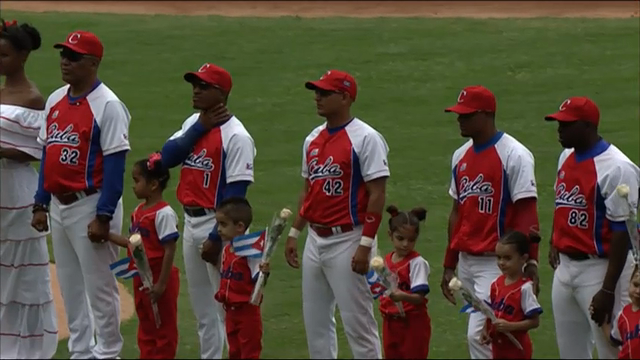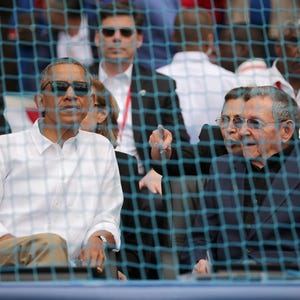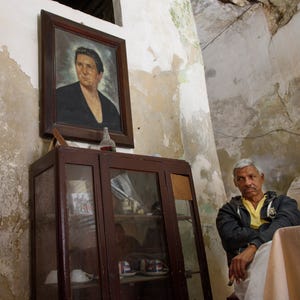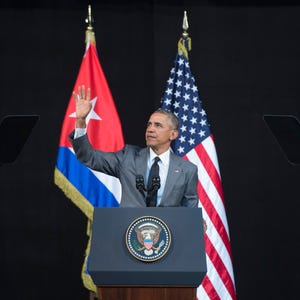Obama brings baseball diplomacy to Havana – USA TODAY

Presidents Barack Obama and Raul Castro enjoyed the much-anticipated exhibition baseball game between the Tampa Bay Rays of Major League Baseball and the Cuban national team in Havana Tuesday afternoon. (March 22)
AP
HAVANA — ¡Pleibol!
President Obama capped off his 48-hour visit to Cuba on Tuesday with a final remarkable moment, taking in a rare spring exhibition game between the Tampa Bay Rays and the Cuban national baseball team in front of 55,000 Cuban and American baseball fans.
Obama was greeted with thunderous applause when he entered the Estadio Latinoamericano in Havana, a welcome all the more palpable when the entire stadium went completely silent in honor of the victims of the Brussels terrorist attacks earlier Tuesday.
Obama settled in just behind home plate with Cuban President Raúl Castro on one side, and his family — first lady Michelle Obama, daughters Sasha and Malia and mother-in-law Marian Robinson — on the other. He chatted with Castro, explained the game to his daughters and greeting the ballplayers, dignitaries and other well wishers. Among them: Rachel Robinson, the widow of baseball great Jackie Robinson, who played in Havana before breaking baseball’s color line with the Brooklyn Dodgers.
There was certainly a festive atmosphere about this Obama family outing. But it was also part of Obama’s broader strategy for people-to-people engagement on the formerly isolated island.
Call it baseball diplomacy.
“Baseball is obviously something that the United States and the Cuban people share a common love of and it’s a part of both of our heritages,” said Deputy National Security Adviser Ben Rhodes, Obama’s top adviser on Cuba. “And frankly, also part of the type of exchanges that we are pursuing in business, in culture, in the arts, in sports that can bring the American and Cuban people closer together.”
The Obama administration announced last week that it was removing the ban on U.S. companies employing Cubans directly — a move that could help baseball sign top Cuban players without them having to defect.
But like so many issues in Cuban-American relations, there are details to be worked out after more than five decades of frosty diplomatic relations. The Cuban government, for example, would not want to give up its investments players without compensation.
“They don’t have any contracts, and they don’t have any contracts because a contract is something that only works in a free enterprise system,” said Peter Bjarkman, author of the upcoming Cuba’s Baseball Defectors: The Inside Story. “They’re not going to have those terms dictated to them. If the Obama administration or MLB pushes too hard to use baseball to open up Cuba, but only on U.S. or MLB terms, that could suddenly raise big roadblocks with the Cubans.”
Though no one outside the stadium cared about the score, the game was a significant event in Cuba even without Obama’s presence. It’s the first time a Major League Baseball team has played in Cuba since the Baltimore Orioles in 1999. Also present for the event: Cuban-born major leaguers Luis Tiant and Jose Cardenal. Also present: Hall of Fame Manager Joe Torre, who led baseball’s goodwill mission to Cuba in December.







